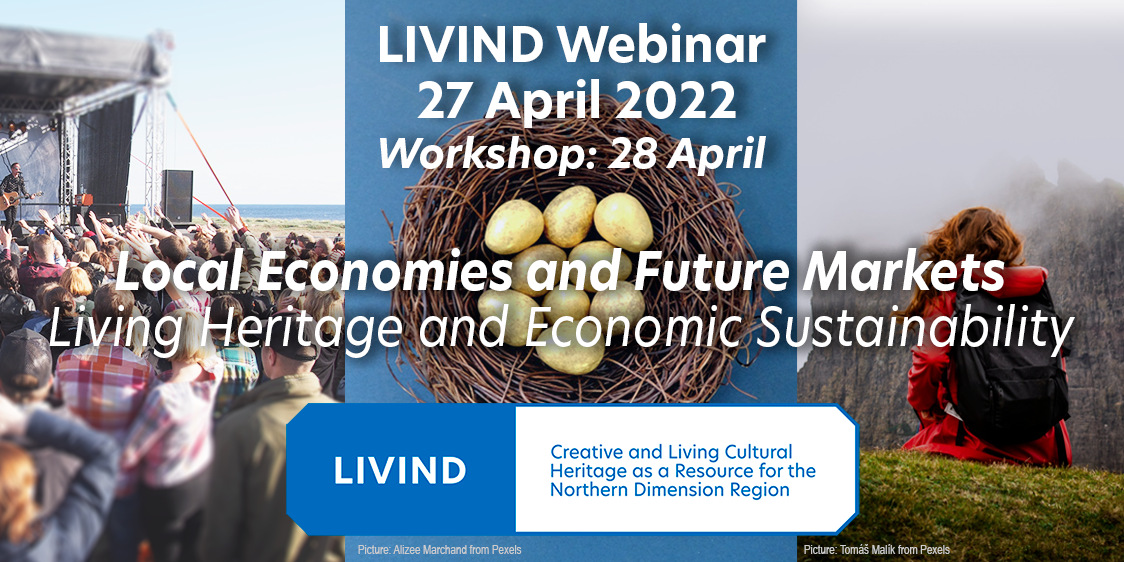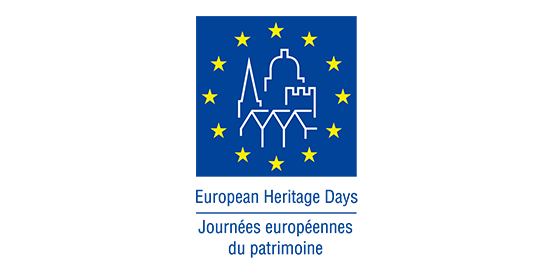
LIVIND webinar: Local economies and future markets for living cultural heritage
Living heritage offers many possibilities to livelihoods, but could we broaden our understanding of living heritage as an ecosystem that feeds local economies? How could practitioners better navigate the changing markets and opt for sustainable solutions, also with attention to heritage-sensitive marketing? What mechanisms would support community actors in mitigating risks and maximizing benefit from living heritage engagement with the market? Join us in the LIVIND webinar to learn more and share your views!
Webinar
You are warmly welcome to the online webinar Local economies and future markets for living cultural heritage on 27th of April 1.30 to 4 pm EET! The event is part of the project LIVIND – Creative and living cultural heritage as a resource for the Northern Dimension region coordinated by the Finnish Heritage Agency and covering nine countries from Northern Europe.
PROGRAMME (13.30-16.00 EET, 12.30-15.00 CET)
13:30 Opening & Welcome, Leena Marsio and Elisa Kraatari, Finnish Heritage Agency
13:40 Living Heritage in local economies, Harriet Deacon, UNESCO ICH facilitator (UK)
13:55 Heritage sensitive marketing, Diego Rinallo, EMLYON Business School (FR)
14:10 Case Examples of Economic Sustainability
- Nature, mythologies and sustainable tourism. Satu de Weerd. Magic of Nuuksio (FI)
- Serfenta model - from crafts research to business, Paulina Adamska (PL)
- Kihnu island - heritage festivals’ impact on local economy, Mare Mätas (EST)
14:50 Questions and discussion with comments by Johan Barstad, University College for Green Development (NO)
15:00 Coffee break
15:10 Discussions in small groups
15:45 Comments & Summary
16:00 Closure
You will hear expert views on the economic roles of living heritage and, through case examples from different countries, learn more about approaches in heritage tourism, festivals, and crafts. Critical reflections will also be heard, and in the small groups you can share your own experiences and views with colleagues across the Northern Dimension region.
You are also welcomed to sign up to the follow-up workshop on 28th April, where you can learn about and discuss these matters more profoundly! We can take up to thirty participants to our online co-work platform, so be quick to book a seat!
The webinar is free and open for everyone whether you are a heritage practitioner, an NGO worker, a museum professional, an entrepreneur, an educator, an artist, an activist, or a researcher. We hope to get together a great group of people working with different domains of living heritage including crafts, performing arts, nature related know-how, oral heritage, festivities, and food among others.
Please, click here to register!
Sign up by 21 April.
We will send the link to participate to all registered.
The workshop is organised by the Finnish Heritage Agency in cooperation with the LIVIND project partners The language of the event is English.
The event is part of the European Heritage Days whose theme in 2022 is Sustainable Heritage.
ABOUT THE LIVIND PROJECT
LIVIND – Creative and living cultural heritage as a resource for the Northern Dimension region started in September 2021. The project is coordinated by the Finnish Heritage Agency and it brings together partners from nine Northern European countries, as well as the Nordic autonomous regions and the Sápmi area.
LIVIND Opening Webinar was organised in November 2021 with participants from 15 countries. This webinar on living heritage and economically sustainable development will be followed by a series of webinars and workshops in 2022, focusing on the different aspects of sustainability: ecological, social, and cultural sustainability.
The LIVIND project builds on the intangible cultural heritage safeguarding work, but it is closely linked to the UN Agenda 2030 for Sustainable Development. The project makes use of diverse web-based tools that support fluent exchange and increased co-development work between the diverse actors including public bodies and NGOs from the different countries and areas. The project also involves research activities resulting as analyses and policy briefs that support the further development on living heritage. These materials, along with the good practices and experiences from the pilots implemented during the project will be later available on an online platform.
More information
https://www.aineetonkulttuuriperinto.fi/en/livind
Elisa Kraatari, project coordinator, elisa.kraatari@museovirasto.fi
Leena Marsio, Senior Advisor, leena.marsio@museovirasto.fi
